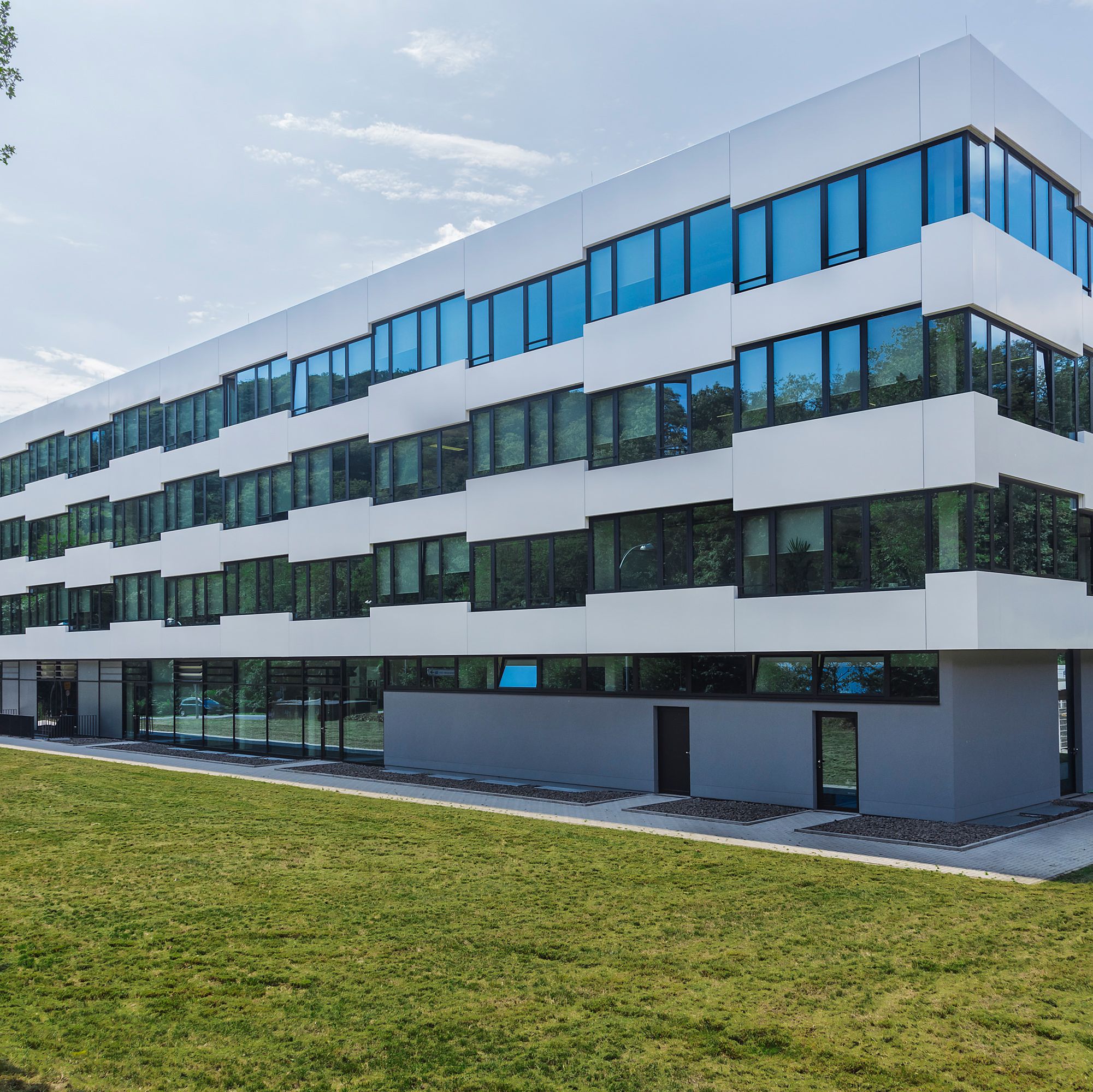Das CISPA Helmholtz-Zentrum für Informationssicherheit widmet sich der ganzheitlichen Erforschung von Cybersicherheit, Datenschutz und vertrauenswürdiger künstlicher Intelligenz. In Saarbrücken Zuhause, bietet das Zentrum exzellente Bedingungen für Spitzenforschung für internationale Talente.
Mit den Mobilitätsprogrammen der HIDA können Data-Science-Talente am CISPA Helmholtz-Zentrum für Informationssicherheit dazu beitragen, digitale Systeme sicherer zu machen, neue Bedrohungsszenarien frühzeitig zu erkennen und innovative Lösungen für eine widerstandsfähige digitale Gesellschaft zu entwickeln.

Über die Helmholtz-Gemeinschaft
Die Helmholtz-Gemeinschaft
Die Helmholtz-Gemeinschaft ist die größte Wissenschaftsorganisation Deutschlands. Unsere übergreifenden Forschungsprogramme verbinden die 18 Helmholtz-Zentren miteinander.
Jedes Zentrum verfügt über eigene wissenschaftliche Schwerpunkte und Infrastrukturen. Die Forschung ist thematisch in sechs strategische Bereiche gegliedert.
- Energie
- Erde und Umwelt
- Gesundheit
- Information
- Luftfahrt, Raumfahrt & Verkehr
- Materie
Das CISPA Helmholtz-Zentrum für Informationssicherheit ist eine führende Forschungseinrichtung für Cybersicherheit, Datenschutz und vertrauenswürdige künstliche Intelligenz in Deutschland und international anerkannt für seine Expertise in den Bereichen IT-Sicherheit und vertrauenswürdige künstliche Intelligenz. Das CISPA leistet bedeutende Grundlagenforschung und erforscht neue Bedrohungsszenarien, entwickelt innovative Sicherheitslösungen und trägt dazu bei, digitale Systeme widerstandsfähiger gegen Cyberangriffe zu machen. Ziel des CISPA ist es, wissenschaftliche Erkenntnisse in praxisnahe Anwendungen zu überführen und die Gesellschaft für digitale Sicherheitsrisiken zu sensibilisieren.
Forschungsschwerpunkte:
- Algorithmische Grundlagen und Kryptographie
- Vertrauenswürdige Informationsverarbeitung
- Verlässliche Sicherheitsgarantien
- Erkennung und Vermeidung von Cyberangriffen
- Sichere vernetzte und mobile Systeme
- Empirische und verhaltensorientierte Sicherheit

Die Standorte
Die Standorte
Die Standorte des CISPA
- Saarbrücken
- St. Ingbert
Kompetenzen des CISPA im Bereich Data Science & KI
Der transformative Einfluss von KI auf die Interaktion zwischen Mensch und Software geht mit einer erweiterten Bedrohungslandschaft und zunehmend komplexen Cyberbedrohungen einher. Am CISPA arbeiten interdisziplinäre Teams eng zusammen, nicht nur um ihr Verständnis von neu auftretenden digitalen Bedrohungen zu vertiefen und innovative Lösungen zur Erkennung und Abwehr neuer Cyberangriffe zu entwickeln, sondern auch um die nächste Generation von KI-Systemen grundlegend neu zu gestalten. Sicherheit, Schutz und Vertrauenswürdigkeit stehen dabei im Mittelpunkt.
- Vertrauenswürdige künstliche Intelligenz
- KI-Sicherheit und -Schutz
- Kausale künstliche Intelligenz
- Privatsphäre in Foundation Models
- Verteilte künstliche Intelligenz
- Sparsifizierung tiefer neuronaler Netzwerke
Mehr als 600 Mitarbeitende aus über 50 Ländern gestalten am CISPA gemeinsam die digitale Sicherheit von morgen.
Bewerbung
Sie möchten am CISPA forschen und arbeiten? Dann bewerben Sie sich jetzt für das HIDA Mobility Program!
Kontaktieren Sie Ihren potenziellen Betreuer oder Ihre potenzielle Betreuerin bitte vorab per E-Mail, um ein Forschungsprojekt vorzuschlagen und zu besprechen. Reichen Sie erst nach dieser Klärung Ihre Bewerbung ein.
Weitere Informationen zu den Bewerbungsregularien finden Sie hier!
Hinweis für externe Bewerber:
Bei Fragen zu Bewerbungsformalitäten und organisatorischen Abläufen wenden Sie sich bitte direkt an Ihr Heimatinstitut.
Die Hosts am CISPA
Lernen Sie hier einige potentielle Gastgeberinnen und Gastgeber am CISPA kennen und erfahren sie mehr über deren jeweilige Data Science-Forschung.
Bitte beachten Sie: Die hier aufgeführte Liste zeigt lediglich eine Auswahl möglicher Gastgeber.
Darüber hinaus können Sie auch eigenständig potenzielle Hosts im Zentrum kontaktieren und mit ihnen eine Teilnahme am HIDA Mobility Program vereinbaren.
Wenn Sie Fragen haben, senden Sie bitte eine E-Mail an: hida@helmholtz.de
Sie möchten selbst gerne Helmholtz-Gastgeber werden und suchen nach Unterstützung für Ihr Forschungsprojekt? Dann wenden Sie sich ebenfalls an die oben genannte E-Mail Adresse.

Krikamol Muandet
Rational Intelligence
Ansprechpartner

Helmholtz Center for Information Security (CISPA) - Rational Intelligence Lab
Three-sentence summary of your group's research:
The group’s research aims at understanding the principles that enable autonomous agents to learn from past experience and interact successfully with complex environments, and to use this understanding to design new machine learning algorithms.
What could a guest researcher learn in your group? How could he or she support you in your group?
Conducting and collaborating on world-class research projects that lie at the intersection of machine learning and economics.

Yang Zhang
Machine Learning and Data Privacy
Ansprechpartner

Helmholtz Center for Information Security (CISPA) - Machine Learning and Data Privacy
Three-sentence summary of your group's research: Yang Zhang is a faculty member at CISPA Helmholtz Center for Information Security, Germany. His research concentrates on trustworthy machine learning. Moreover, he works on measuring and understanding misinformation and unsafe content like hateful memes on the Internet. Over the years, he has published multiple papers at top venues in computer science, including CCS, NDSS, Oakland, and USENIX Security. His work has received the NDSS 2019 distinguished paper award and the CCS 2022 best paper award runner-up.
What could a guest researcher learn in your group? How could he or she support you in your group? The guest researcher could learn experiences from our research domains and learn each other.

Franziska Boenisch
Trustworthy Machine Learning
Ansprechpartner

CISPA - Helmholtz Center for Information Security - Machine Learning Research: Group on Secure, Private, Robust, INterpretable, and Trustworthy Machine Learning
Three-sentence summary of your group's research: Our group, the SprintML lab focuses their research on Secure, Private, Robust, INterpretable, and Trustworthy Machine Learning. We make sure that data processing through machine learning models respects the privacy of their training data, and that after training, the model makes robust, secure, and interpretable predictions.
What infrastructure, programs and tools are used in your group? We rely on high performance computing infrastructure and GPU clusters from the Helmholtz association. Our software is mainly developed in Python and deployed to the GPU clusters in form of GitHub containers.
What could a guest researcher learn in your group? How could he or she support you in your group? The participant will learn how to automatically process data and manage information through the lens of trustworthy machine learning. They will be given the opportunity to discover the risks to machine learning privacy, robustness, and security that arise from the data itself or the training procedure. They will explore mitigation methods to the most crucial risks, and get the chance to implement those themselves, or expand them to new contexts. Finally, the participant can extend their knowledge on publishing academic results in the area of trustworthy machine learning, and will, in the best case, contribute to a paper submission to a top tier machine learning conference. We welcome all participants with a background in machine learning, and an interest in developing data processing that goes beyond considering only utility of the resulting application.

Rebekka Burkholz
Relational Machine Learning
Ansprechpartner

CISPA - Helmholtz Center for Information Security - Relational Machine Learning
Three-sentence summary of your group's research: Our main goal is to reduce the computational costs associated with deep learning based on algorithmic innovations and theoretical insights with practical implications. We particularly enjoy tackling problems that involve graph based data. Most of the applications that motivate us are in the biomedical domain or economics ranging from modeling gene regulatory dynamics, gaining insights into cancer drivers, understanding sex differences, or analyzing systemic risk in international food trade.
What infrastructure, programs and tools are used in your group? As a lot of our projects involve deep learning and neural network sparsification, we make use of GPU clusters.
What could a guest researcher learn in your group? How could he or she support you in your group? We would be happy to collaborate on interesting applications as well as method development in the machine learning domain.

Adam Dziedzic
Secure, Private, Robust, INterpretable, and Trustworthy Machine Learning
Ansprechpartner

CISPA - Helmholtz Center for Information Security - SprintML
Three-sentence summary of your group's research: Our research is focused on secure and trustworthy Machine Learning as a Service (MLaaS). We design robust and reliable machine learning methods for training and inference of ML models while preserving data privacy and model confidentiality. We are focused on the state-of-the-art ML methods and models, such as, self-supervised learning, large language and vision models (LLMs), foundational models.
What infrastructure, programs and tools are used in your group? We use large scale GPU clusters and program in the latest ML frameworks.
What could a guest researcher learn in your group? How could he or she support you in your group? As a guest researcher you can learn how to use tools from data privacy and model confidentiality to enable trustworthy machine learning. We also support our guests with theoretical analysis as well as running large scale experiments to publish at the top ML conferences.



